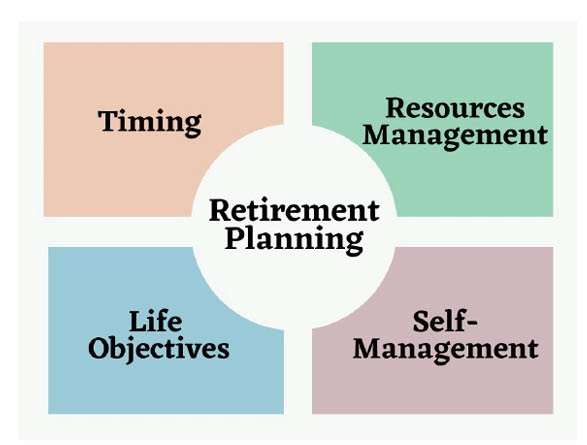To understand how we can adjust well to retirement, it will help to know the basics of how our mind, brain, and body work towards seizing opportunities and facing challenges in life.
We have great capacities: The late Stephen Hawking was born in 1942 in England. He studied physics and chemistry at the University College, Oxford, graduating with a First Class. In his final undergraduate year, he started getting increasingly clumsy and his speech slightly slurred. Medical examinations revealed a rare form of early onset and slow-progressing Amyotrophic Lateral Sclerosis (‘ALS’). Doctors did not expect him to live for more than two years.
Over the decades, the disease completely paralysed Hawking. With time, he lost all his speech capability, communicating only through a computer attached to his wheelchair. Despite his physical challenges, Hawking remained mentally, alert, brilliant, humorous and contributing immensely to the fields of physics, mathematics, cosmology, and astronomy. He said his communication through the computer was ‘better’ than before he lost his voice, and of his disease, ‘I have had motor neuron disease for practically all my adult life, yet it has not prevented me from having a happy family life and being successful in my work. … In fact, although there was a cloud over my future, I found, to my surprise, that I was enjoying life in the present more than ever before.’ Stephen Hawking died in 2018 as one of the greatest scientists of the last two hundred years and an author of several best-selling books.
Besides Dr. Hawking, the world is full of people who have done superlatively well in very difficult situations. Individuals surviving while lost at sea; Individuals from modest backgrounds succeeding in life against all sorts of odds in academia, business, politics, and philanthropy. What is common to all is having the ‘right’ mindset that opens our great capacities.
- Gaza invasion could lead to ‘genocide’, say Arab League, AU
- Mob attacks 70-year-old woman found with stolen 2-year-old baby in Lagos
As human beings, our brains and minds are inseparable, being a part each of a complex working partnership. Nonetheless, we can see our brain as the physical box containing all the wirings, connections, and storage capacity that we need to function. On the other hand, the mind is the software that serves as the operating system that interprets and processes massive amounts of information every second of our lives.
Our conscious mind is responsible for gathering data, making comparisons and decisions, controlling short-term memory and ‘giving orders’. It is the aware part of the mind. On the other hand, the unconscious mind is responsible for many things that we are not necessarily alert to all the time. These include our breathing, temperature regulation, storage, and retrieval of long-term memories, etc. The unconscious mind doesn’t make judgements. Instead, it just takes whatever it is given as ‘the truth’ irrespective of the veracity of the information behind it.
Fixed and Growth mindsets: In simple terms, our mindset is a comprehensive collection of our opinions, beliefs, values, etc. It shapes how we think about our abilities, talents, and what we can do. From a psychological perspective, mindset refers to internal perceptions that govern what possibilities exist within our potentialities. It helps us deal with different situations through various possible responses. Mindsets are formed, shaped, and may be altered through experience, learning, interactions with influential others, etc. Dr. Carol Dweck, world-renowned Stanford University psychologist, classifies mindsets into ‘fixed mindset’ and ‘growth mindset’.
With a fixed mindset, an individual believes their ability is innate, carved in stone and therefore unchangeable. For this reason, they would rather choose an easy task than a difficult one that may require more effort regardless of differences in benefits. Individuals with a fixed mindset tend to resist challenges, avoid taking risks, fear making mistakes, view failure as permanent and give up easily on obstacles which they consider as fixed. Furthermore, fixed mindsets can lead to comparisons with others, feelings of frustration and jealousy, and an inability to take feedback positively.
Individuals with a growth mindset, on the other hand, believe abilities and talents can be improved through gaining knowledge and practice. They embrace challenging tasks, work hard, are smart and see obstacles as movable and opportunities to experiment in new ways. Whilst individuals with a fixed mindset focus on transactional achievements, those with a growth mindset focus on the ‘big picture’, the journey ahead and continuous improvement. For a person with a growth mindset, the success and achievements of others as well as positive critiques are inspirations to grow and succeed personally.
Unfixing a fixed mindset: Without a doubt, and as we have seen in the last few weeks, the about-to-retire and retiree, have a lot of valid concerns going into a new phase in life. To succeed in adjusting well to retirement, the starting point is to unfix any fixed mindset we may have and build on our growth mindsets through the following:
1. See the big picture in the journey into a new context,
2. Accept that we can change and improve over time,
3. View challenges as learning and growth opportunities,
4. Commit to lifelong learning in controlled ways and from others,
5. Take setbacks and even failures as learning moments,
6. Be realistic but generally positive, etc.
Next week, we will begin to take up how each concern we may have about retirement should be understood and addressed in the light of a growth mindset.

 Join Daily Trust WhatsApp Community For Quick Access To News and Happenings Around You.
Join Daily Trust WhatsApp Community For Quick Access To News and Happenings Around You.